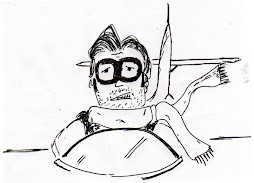 The situation does not appear to be good in our hospitals. We had 13,648 cases of Staphylococcus aureus infection in hospitals in 2006 with only the nastier version , Methicillin Resistant Staphylococcus aureus (MRSA) appearing on 1,652 death certificates ( an under-reporting?) A stained pin head's worth of 'staph' is shown below so that you can recognise the bacterium.!
The situation does not appear to be good in our hospitals. We had 13,648 cases of Staphylococcus aureus infection in hospitals in 2006 with only the nastier version , Methicillin Resistant Staphylococcus aureus (MRSA) appearing on 1,652 death certificates ( an under-reporting?) A stained pin head's worth of 'staph' is shown below so that you can recognise the bacterium.!
If you consider that MRSA causes meningitis, pneumonia and toxic shock syndrome and is scary, we have other nasty bacteria in our hospitals; E. Coli cases up by 48% in 2007; Clostridium difficile showing a 72% rise in 2007 with over 5,000 deaths attributed to it; Klebsiella pneumoniae 5,198 cases hitting and killing people who have underlying lung problems (causes abscesses in the lungs); Streptococcus pneumoniae 4,553 cases and 14,943 cases of Coagulase negative staphylococcus causing bloodstream infections. In the USA, C. difficile was responsible for 18,650 deaths last year and now exceeds AIDs deaths there. What are the real risks today in the UK concerning acquiring a serious hospital infection? High , is the probable answer.
The historical period of effective anti-biotics has perhaps now passed after 50 years and we need to re-institute simple Victorian inspired hygiene measures that lapsed because we had the anti-biotics to sort out problems caused by slack hygiene. Anyone who remembers a hospital stay in the early 1950s will recall deep cleaning by nurses as a constant activity on a ward; restricted visitors and very limited and short visiting times and a clinically spotless and uncluttered ward environment. Today, the modern hospital has people strolling in at all hours, clutter everywhere and staff being 'urged' to wash their hands and a 're-education' programme of NHS staff in full swing. The public is even being bombarded with adverts to 'wash hands'!
Does anyone remember 'no spitting' signs as a simple anti-TB hygiene measure and yet spitting is now endemic and not helped by football players, in particular,spitting all over our TV screens. TB is now on the increase, having been almost eradicated in this country. In terms of public hygiene, it seems we need to return to the days before anti-biotics became the miracle cure of bacterial infections; those days are now past.













4 comments:
Very graphic illustration, you have my every symphathy. MRSA, E. Coli, Clostridium Difficile infections are all very serious problems. It is possible to be too alarmist though. Infection rates in our East Kent Trust hospitals are falling rapidly. Cleanliness is of course very important particularly for controling C Diff. MRSA and E Coli are endemic in the population and are being controlled by screening patients on entry to hospital and treating appropriately. The aim must be to move towards treating more patients as out patients and single bed rooms in hospitals, but this will take continued investment and changes in nursing practice.
Our hospitals are very different, much more intensive and much more succesful places than Victorian times. You are right though, we can all help to monitor cleaning standards
Cllr Green,I am glad to say that it is not my thigh in the picture and my problem is not MRSA thank goodness but thanks for your concern. My point is really that with anti-biotics no longer being the wonder drugs of earlier years, methods of infection control developed by hospitals prior to the 'age of penicillin' must return.
Cllr Green
Not for the first time I point to the tendency in Thanet for people to be ever on the touchline never on the pitch.
In recent years there was an incident on Cheerful Sparrows Ward. The night shift cleaning team seemed not to be entirely happy with the quality of colleague recruited by the privatized cleaning company (Ultimately owned by Tarmac I think)
One in particular was said to be from NACRO. An ex offender who spent his night shifts dossed down in a waiting room whilst his colleagues did the work. Until. so the account goes, one of the ex forces colleagues decided to inquire if the NACRO man knew where A and E was .. then expained that unless he quit the post the NACRO man would be needing it !
I understand that NACRO man naffed off never to return.
Another member of the cleaning team was said to be a SOFTWARE engineer. And from time to time the QEQM would ask him for a favour to sort out hospital computer problems. So yet another team member might end up doing no cleaning.
One night Cheerful Sparrows phoned. And a cleaner (known to you) went up there to see rolled up towels had been placed by nurses in the well known method of incarcerating microbes ... the dam.
In the toilet there was a growing puddle of backfill from the lavatory. Which included evidence not just of faeces but of surgical waste !
The cleaner was unable to use a suction machine because it had been broken down for months. So equipped only with a bucket and marigolds he set to work.
His GP apparently later hit the roof and tested him for every infection known etc.
And the cleaner corresponded with the employer. Only for the usual drivel "Lessons will be learned, the company is committed to ... blah dee blah"
The problem of cleaning divorced from nursing highlighted!
Post a Comment